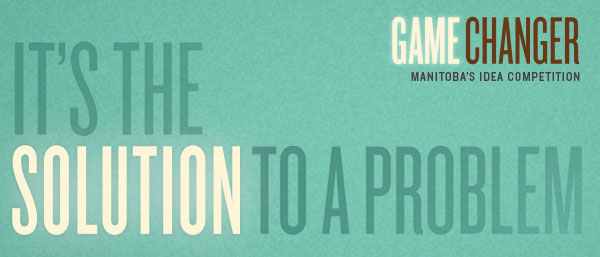
Hear the proposed solutions from teams at Game Changer finale
Seven finalist teams have been chosen to move forward to present their solutions at the Grand Finale Event of the Game Changer Competition on Tuesday, Nov. 14, 4:00 p.m. – 6:00 p.m. in EITC Atrium.
The solution entries were scored based on novelty of solution; clear and concise (no scientific jargon); feasibility and ease of implementation; scalability; entrepreneurial spirit; cross discipline members; sustainability; and innovation.
The teams chosen address five of the six problems.
The problems and teams tackling them are:
SOCIETAL: How can we ensure society will be adequately prepared to handle challenges associated with our aging population?
Team: Due North Systems
James Warren (Red River College, Business Information Technology, ACE), Denys Fiialko (Red River College, Business Information Technology, ACE), Jared Kozak (University of Manitoba, Asper School of Business)
Solution: Develop a user-friendly mobile application to connect people (ages 30-50 years) for the purpose of mentorship, co-op housing in exchange for services rendered. The application will be the “Tinder” of mentorship and community outreach.
Team: Health on Hand
Quynh Doan (Red River College, International Business), Xuan Nguyen (Red River College, International Business), Fernando Karamm (Red River College, International Business), James Warren (Red River College, Business Information Technology)
Solution: Create a peer-to-peer mobile application that facilitates service to deliver healthy food options and medication (non-prescription and prescription) directly to the home of the senior citizen.
Team: Degreezy
Sanjay Abraham (University of Manitoba, Mechanical Engineering, Faculty of Engineering), Nina Lam (University of Manitoba, Faculty of Arts), Rylan Ramnarace (University of Manitoba, Global Political Economy, Faculty of Arts),
Solution: ElderBuddy is a non-profit social enterprise that uses a distributed network to connect seniors with volunteer caregivers, Volunteer caregivers serve as a companion to their buddy and assist them with day-to-day needs, providing them with emotional and social support.
TECHNOLOGY: How can artificial intelligence assist us in sustainable development?
Team: Software Trainers
Beom-Jin Park (University of Manitoba, Computer Science, Faculty of Science), Rochelle Morris (Red River College, Computer Aided Drafting, Science), Anton Sitnikov (University of Manitoba, Agricultural Business, Faculty of Agricultural and Food Sciences) Nhat Thanh Vu (University of Manitoba, Faculty of Science), Daniel Heslop (University of Manitoba, Physics, Faculty of Science)
Solution: To resolve traffic congestion and to reduce the number of car accidents in the near future, use existing artificial intelligence neural networks consisting of CNN (Convolutional Neural Network) and RNN (Recurrent Neural Network)
EDUCATION: How do we improve child literacy and numeracy in Manitoba?
Team: We Teach
Aisha Haji-Hussein (University of Winnipeg, Faculty of Science; Faculty of Business and Economics), Ebun Olorundare (University of Winnipeg, Faculty of Applied Computer Science; Faculty of Business and Economics), Marii Balcha (University of Winnipeg, Faculty of Kinesiology),
Solution: Design a customized learning program that is a handbook for mentors or educators along with a user friendly mobile application for teaching purposes.
HEALTH: How can we provide better mental health care to marginalized and lower socioeconomic groups?
Team: Just a Warm Sleep
Dell Dyck (University of Manitoba, Faculty of Law), Haley Hickey (University of Winnipeg, Human Rights), Tessa Blaikie Whitecloud
Solution: Provide a mental health care services to Winnipeg’s street population at homeless shelters in Manitoba.
SOCIETAL: With technology filling all our free time, how can we reclaim boredom as a productive or creative force?
Team: Hour Off
Kira Pearson (University of Manitoba, Asper School of Business), Piesebel Berlane Pasco (University of Manitoba, Faculty of Science), Indigo Adam-Grant (University of Manitoba, Asper School of Business)
Solution: Create a societal movement to encourage people to be “screen free” for one hour a day to make a daily incremental change.
Game Changer: Manitoba’s Idea Competition is an exciting contest that gives all Manitobans an opportunity to identify global problems and work in teams to devise innovative game-changing solutions.
With a $10,000 grand prize up for grabs, the teams will present to a panel of judges, with a second prize of $5,000, a third prize of $2,500 and an additional award of $500 goes to the People’s Choice.
Judges this year are:
Nicole Fontaine, Liaison Officer, World Trade Centre
Joelle Foster, Director, Manitoba, Saskatchewan and the North, Futurpreneur
Aman Goyal, Venture Leader, Creative Destruction Lab
Research at the University of Manitoba is partially supported by funding from the Government of Canada Research Support Fund.






